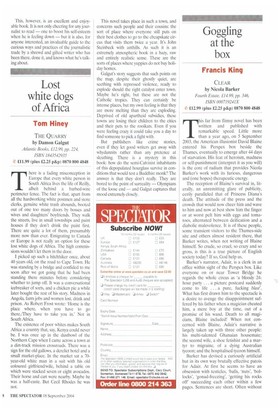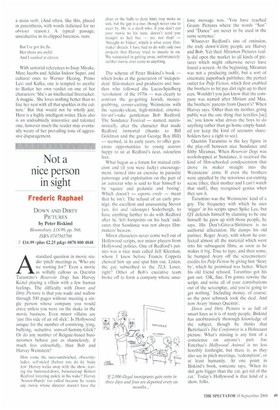Goggling at the box
Francis King
CLEAR by Nicola Barker Fourth Estate, L14.99, pp. 346, ISBN 000719241X (t, 112.99 (plus £2.25 p&p) 0870 800 4848 This far from flimsy novel has been written and published with remarkable speed. Little more than a year ago, on 5 September 2003, the American illusionist David Blaine entered his Perspex box beside the Thames, eventually to emerge after 44 days of starvation. His feat of heroism, madness or self-punishment (interpret it as you will) is the core of radium that provides Nicola Barker's work with its furious, dangerous and (one hopes) therapeutic energy.
The reception of Blaine's survival in, literally, an unremitting glare of publicity, eerily paralleled that of Princess Diana's death. The attitude of the press and the crowds that would now cheer him and wave to him and now at best show him the finger or at worst pelt him with eggs and tomatoes, alternated between deification and a diabolic malevolence. It is of these people, some transient visitors to the Thames-side site and others almost resident there, that Barker writes, when not writing of Blaine himself. So crude, so cruel, so crazy and so gross, is this is a true picture of English society today? If so, God help us.
Barker's narrator, Adair, is a clerk in an office within sight of the Perspex box. Like everyone on or near Tower Bridge he regards the whole circus as 'a bloody 247 hour party . . . a picture postcard suddenly come to life . . . a pure, fucking blast'. What has first drawn him to the spectacle is a desire to avenge the disappointment suffered by his father when a magician cheated him, a mere boy at the time, out of a promise of his wand. Death to all magicians, BlaMe included! When not concerned with Blaine, Adair's narrative is largely taken up with three other people: his multi-talented Ghanaian housemate; the second wife, a shoe fetishist and a martyr to migraine, of a dying Australian tycoon; and the hospitalised tycoon himself.
Barker has devised a curiously artificial but in its own way brutally effective patois for Adair. At first he seems to have an obsession with testicles, 'balls, 'nuts', 'bollocks', `gonad-freezing', 'getting his rocks off succeeding each other within a few pages. Sentences are short. Often without a main verb. (And often, like this, placed in parenthesis, with words italicised for no obvious reason.) A typical passage, unseductive in its clipped bareness, runs:
But I've got the flu. Her shoes are awful. And I wanked at eleven.
With sartorial references to Issay Miyake, Marc Jacobs and Adidas Indoor Super, and cultural ones to Werner Herzog, Primo Levi and Kafka, one is tempted to ascribe to Barker her own verdict on one of her characters: 'She's an intellectual firecracker. A magpie. She loves nothing better than to line her nest with all that sparkles in the culture.' But that would not he wholly just. Here is a highly intelligent writer. Here also is an undoubtedly innovative and talented one, however much the reader may eventually weary of her prevailing tone of aggressive disparagement.



















































































 Previous page
Previous page